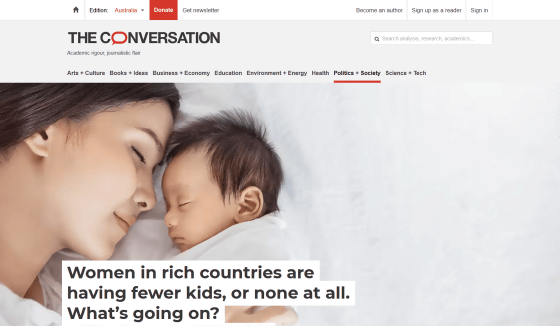Why are women in developed countries having fewer children?

In Western countries and developed countries in Asia, the low number of newborns has become a social problem. In particular, Japan has one of the lowest birth rates in the world, along with South Korea and Italy, with
Women in rich countries are having fewer kids, or none at all. What's going on?
https://theconversation.com/women-in-rich-countries-are-having-fewer-kids-or-none-at-all-whats-going-on-229185

First, to maintain the current population, the total fertility rate needs to be at least 2.1, meaning the number of children each woman gives birth to must exceed 2.1. This is because, in addition to the two children for each parent who gives birth, women need to have a few extra children to account for infant mortality.
If you want to increase the population, you just need to have more women giving birth to two or more children. In fact, after World War II, many Western countries, including Australia, the UK, and the US, experienced a baby boom, and it was not uncommon for families to have three or more children.
However, since then, many developed countries have seen their total fertility rates fall below 2.1. The United States and Australia have recorded record lows of 1.6, the UK 1.4, and South Korea 0.72 , creating a crisis. A declining population leads to problems such as an aging society as a whole, poverty, and the inability of families to provide care.

Ruppanna cites four reasons why birth rates are declining primarily in developed countries:
◆1: Women's educational levels are rising
Opportunities for women to receive higher education have risen steadily over the past few decades, with
There are several reasons why rising educational levels reduce birth rates. First, women spend more time in school, so they have their first child at a later age. Second, earning a degree gives them an advantage in the market, so working women are more likely to choose a career over marriage and childbirth. In short, fewer women are giving birth in their teens and early twenties because their educational levels have risen and they are pursuing working careers.
◆2: People are having children at a later age
Young people believe that having a stable job and owning their own home are important for having children, but these goals are difficult to achieve in modern society. As a result, many young people tend to delay childbirth due to concerns about finances and housing. In addition, the widespread availability of safe and effective contraception has made it possible to have sex without the possibility of reproduction, which is also a factor in the delay in having children, Luppanner points out.

◆3: Raising children takes too much time and money
The cost of raising a child is staggeringly high in many developed countries. The average cost of childcare in Australia is
The more people you have, the more expensive it becomes, and in recent years, child-rearing norms encourage you to spend a lot of time with your children, and you are required to spend more time raising each child than in previous generations. Because it takes time, money, and a huge amount of energy to 'raise children properly' while working, the hurdles to having children are getting higher and higher.
4. Workplaces and policies are not fully adapted to child-rearing
While the COVID-19 pandemic temporarily increased remote work, many workplaces are returning to in-person work. Adding childcare responsibilities to the mix can increase workers' risk of burnout .

The causes of declining birth rates are many and varied, so it's not something that can be solved with a single, simple solution like giving people a lump sum every time they have a baby. 'If we're serious about supporting childcare, we need better career and housing pathways for young people, more investment in childcare and elderly care infrastructure, technological innovation to support an ageing society, and creating workplaces that put childcare at the core, so that we can create a culture of care that supports mothers, fathers, children and the whole family,' said Luppanner.
Related Posts:
in Note, Posted by log1h_ik







